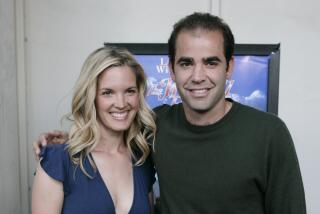A Winner in Game of Life
- Share via
Pete Sampras won the Wimbledon tennis championship Sunday and it couldn’t happen to a nicer guy.
I make this point because tennis can use all the nice guys it can get.
Sam and Georgia Sampras didn’t raise their child to be anybody’s brat.
After some of the tantrums thrown by the tennis-the-menace set at the 1990 U.S. Open, I will always remember Pete’s mother asking: “You think I want to see my son like that ?”
Characters come and go, and many have been entertaining. I have often been amused by the tomfoolery of John McEnroe and Jimmy Connors, who were recently referred to by rival Brad Gilbert as “Bart Simpson’s evil twins.”
But eventually at any circus you tire of watching the clowns and can’t wait for the serious acts to begin.
All Pete Sampras does is play tennis. So far, we haven’t heard any of his political views, haven’t seen any obnoxious TV commercials, haven’t had incessant updates on his love life, haven’t blushed or covered children’s ears at his language, haven’t been shamed worldwide by his behavior and haven’t even seen him wear anything unusual. We see no childishness, no Sampras in Pampers.
He plays tennis.
“Pete doesn’t get caught up outside the lines,” Gilbert writes in a new book on tennis with a title, “Winning Ugly,” that obviously has no connection to Sampras.
“He’s always composed and doesn’t let himself get concerned with the crowd, bad calls, disruptions or anything else. You’ll see him settle himself down with a few deep breaths and a couple of ball bounces. Very cool. He refuses to waste energy or emotions on anything except what’s happening inside the lines.”
You’ve heard about tennis players whose family members provide enough distraction to drive anybody crazy?
Meet the Samprases.
When Pete was 19 and won the 1990 U.S. Open in New York for his first major title, Sam and Georgia Sampras were shopping 3,000 miles away at a Long Beach mall.
Georgia glanced at her watch, went into an appliance store and found a man watching football on a bank of 20 television sets.
“Excuse me,” she said. “Can you tell me who won the tennis tournament?”
“That kid Sampras,” the man said.
“Oh, that’s my son!” Georgia said. “Thank you!”
They raised Pete right, then sent him out into the world. As a girl in Greece, Georgia was one of eight children. Her parents taught the boys to grow up fast and become men. She matured quickly herself, came to America in her late teens and met a strong young Greek man from Chicago, Soterios Sampras.
She and Sam supervised their son as a tennis prodigy, but didn’t dominate him. They encouraged his improvement, but had one demand: “Be nice, be good,” as Georgia put it in an interview after the Open of ’90.
So far, he is both.
And strong, too. Pete wasn’t even sure his shoulder was strong enough to permit him to play at Wimbledon this year. How could he deliver that sizzler serve of his--”Peter’s Heater,” Gilbert calls it--without a pain-free arm?
By day’s end Sunday in London, you couldn’t tell Sampras was anything less than at the top of his game.
Oh, sure, on the sideline he slouched, burying his face in his palms. But on the court, even on Jim Courier’s last service, just as McEnroe was telling a TV audience that Sampras would put up minimal “resistance” and wait for his own service, there was Pete, propelling himself Boris Becker-style to save the point.
“Pete will dive at the ball and on the absolute full stretch hit a soft drop volley for a winner,” Gilbert writes, almost prophetically. “Cruel. His techniques are hard to copy . . . he hits shots with what I call his ‘loosey-goosey’ technique--wristy, flashy strokes that call for tremendous skill.”
Near a segment he cleverly calls Pete’s Principles, Gilbert writes that on days when Sampras is serving up aces, he starts taking chances on his return of serve , putting gobs of pressure on an opponent who suddenly senses that Sampras is now so cool, he takes winning his own service for granted.
“Pete the Heat is one of the great ones out on tour,” Gilbert writes. “He has great skills, great composure and he’s a smart player. That’s the combination for becoming a legend.”
That, and being a nice guy who finishes first.
More to Read
Go beyond the scoreboard
Get the latest on L.A.'s teams in the daily Sports Report newsletter.
You may occasionally receive promotional content from the Los Angeles Times.










